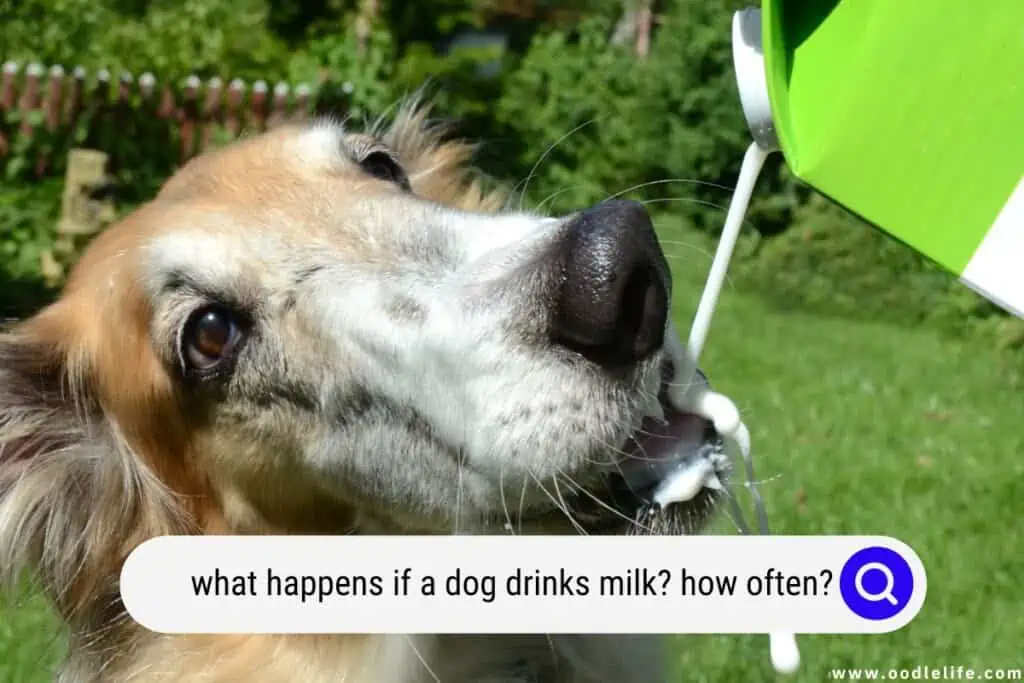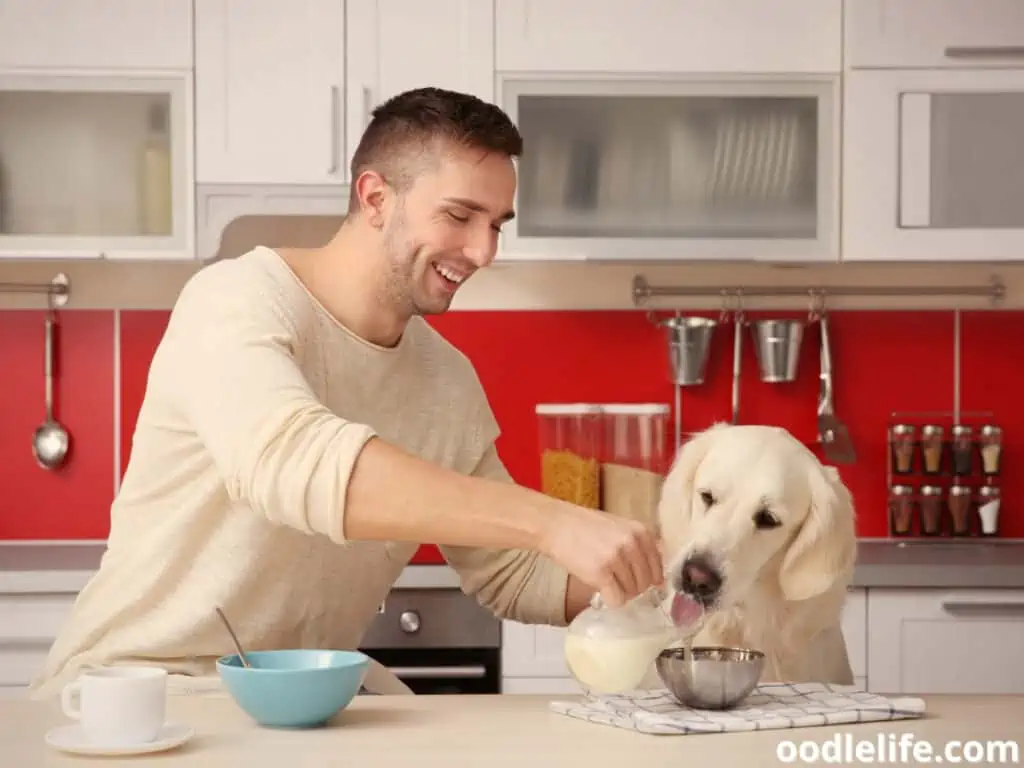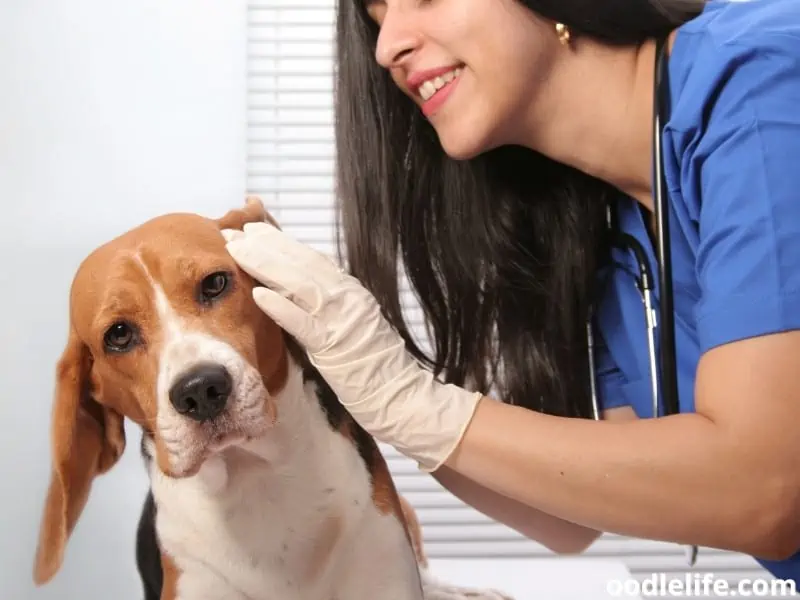What Happens if a Dog Drinks Milk? How Often?
Have you ever given your dog a bowl of milk? If so, you might be wondering what happens if a dog drinks milk. While it is safe for dogs to consume small amounts of milk, there are some potential risks associated with giving them too much.
In this post, we’ll explore what happens if a dog drinks milk and how often they can safely consume it. By the end, you’ll better understand the implications of giving your furry friend milk.

So, let’s dive in!
Are All Sources of Milk Safe for Dogs?
Milk is a great source of nutrients and can benefit humans and dogs alike. However, not all types of milk are safe for dogs to consume. In this blog post, we will explore some of the most commonly available sources of milk and discuss which ones are safe—and unsafe—for your furry friend.

Cow’s Milk
Cow’s milk is the most popular type of milk consumed by humans, but it may not be the best choice for our canine companions. Cow milk contains lactose, which can cause digestive issues in some dogs.
If you want to occasionally give your dog cow’s milk as a treat, make sure to choose an unsweetened variety that’s low in fat. If your dog has a sensitive stomach or tends to get bloated after consuming dairy products, it’s best to avoid giving them cow’s milk altogether.
Mother’s Milk Products
Mother’s milk products are specially formulated supplements designed to boost the immune system of dogs of all ages. They are sold in powdered form and contain several vitamins and minerals that can improve your pup’s digestion and overall health.
However, these supplements are not lactose-free, so they should only be given occasionally or with veterinary approval if your pup is sensitive to dairy products.
Lactose-Free Milk
Lactose-free milk is made from cow’s milk that has been treated with an enzyme called lactase, which breaks down the lactose into simpler sugars, making it easier for your pup to digest. However, lactose-free milk tends to be higher in sugar than regular cow’s milk, so read the label carefully before giving any to your pet.
Goats Milk
Goats’ milk is another option when looking for a suitable alternative to traditional cow’s milk. It contains higher levels of protein and lower levels of lactose than cow’s milk, making it easier on your pup’s tummy if they have difficulty tolerating lactose in their diet.
Plant-Based Milk
Plant-based milk, such as almond or coconut milk, may seem like a good alternative. Still, they often contain added ingredients like sugar or thickeners that may not be suitable for dogs with sensitive stomachs or allergies, so check the label carefully before giving any plant-based milk to your pup.
Flavored Milk
Flavored milk usually contains high amounts of sugar, which can be bad for your pup’s teeth and overall health, so it’s best avoided unless specifically recommended by a veterinarian as part of a prescribed diet plan for weight loss or diabetic control purposes.
Additionally, many flavored kinds of milk also contain artificial sweeteners like xylitol which can be toxic to dogs. So always read the labels carefully before giving any flavored milk products to your pet!
With so many different types of milk available on the market today, it can be hard to know which one is safe for our four-legged friends! Generally speaking, plain unsweetened cow’s or goat’s milk is fine as an occasional treat. However, it should never replace regular meals or treats due to its high-fat content and potential lactose intolerance issues among some pups.
Symptoms of Dairy Allergies in Dogs
Does your pup have itchy skin, recurrent ear infections, or digestive issues? If so, dairy allergies could be to blame. Unfortunately, many dog owners don’t realize that their pup can be sensitive or even allergic to dairy products, which can lead to a range of uncomfortable health problems.

Dry Itchy Skin
One of dogs’ most common symptoms of dairy allergies is dry, itchy skin. If your pup has been scratching more than usual lately, it could be related to their diet. Dogs with dairy sensitivities may also suffer from hot spots on their skin, which are red and inflamed areas caused by constant itching and biting.
Ear Infections
Ear infections are another tell-tale sign of dairy allergies in dogs. When an allergen like milk protein enters your pup’s system, their body responds by producing high levels of histamine – which can make them extra susceptible to bacterial or fungal ear infections.
Loss of Appetite
If your furry friend doesn’t seem as interested in their food as they used to be, it could signal sensitivity to the ingredients in their kibble – including milk proteins and other dairy products like cheese or yogurt.
GI Issues
Dairy allergies can cause a variety of GI issues in dogs, such as vomiting, diarrhea, and flatulence (yes – gassiness!). Many pet parents may think this is “normal” for their pup, but it doesn’t have to be!
If you suspect your pup may be sensitive to certain foods – including those containing milk proteins – consider switching them to a grain-free diet made with limited ingredients and natural sources for optimal digestive health.
Hot Spots
Hot spots are another symptom associated with canine food sensitivities – particularly when the culprit is dairy protein! These little red sores can develop due to persistent itching and scratching caused by an allergic response – and they usually require some type of treatment, such as topical ointments/medication or antibiotics (depending on the severity).
Avoid Giving Your Dog Milk With These Health Conditions
If you’ve ever been tempted to give your pup a bowl of milk, it might be worth taking a step back and doing some research first. While dogs enjoy dairy products, it’s not always the healthiest option.

In fact, there are certain conditions where giving your dog milk can be dangerous. Let’s break down when to avoid giving your dog milk so that you can make sure your pup stays safe and healthy.
Lactose Intolerance
If your pup is lactose intolerant, giving them milk can be dangerous. Symptoms of lactose intolerance in dogs include flatulence, GI issues (such as vomiting or diarrhea), bloating, and loose stool.
If you suspect that your pup may have this condition, speak with your vet right away so they can diagnose the problem and suggest alternative ways to ensure that they get enough calcium in their diet without causing any discomfort or harm.
Pancreatitis
Pancreatitis is an inflammation of the pancreas caused by excessive fat in the diet. Giving a dog with pancreatitis dairy products can worsen their condition due to its high fat content.
To avoid exacerbating their condition by feeding them dairy products, stick to low-fat sources of calcium such as bone meal or calcium supplements from the vet instead.
Overweight Dogs
In addition to being high in fat content, dairy products are also high in calories which means they should be avoided if your pet is overweight or obese — especially since obesity increases their risk for developing several other serious health problems such as diabetes and joint issues later on down the road.
Healthy Dairy Products for Your Dog
If you’re wondering what kind of dairy products you can give your furry buddy, then look no further!

Here are four healthy dairy products perfect for giving your dog the necessary nutrients.
- Yogurt is an excellent source of calcium and high-quality protein. It also contains beneficial bacteria, which help keep their digestive system running smoothly. However, read the label carefully before giving it to your pup; some yogurts contain added sugar or artificial sweeteners that are unsafe for dogs. Be sure to get plain yogurt with no added sweeteners or flavors.
- Kefir is another great option for a healthy dairy product for your dog. Kefir contains probiotics, which help maintain the balance of good bacteria in their digestive tract. It also has plenty of calcium and vitamin B12, which can benefit their bones and muscles. Again, make sure to get plain kefir without any added sugar or flavorings.
- Cottage cheese is an excellent source of protein and calcium that can be easily incorporated into your pup’s diet. You can serve it as-is or mix it with other foods, such as vegetables or canned food. Cottage cheese also contains whey protein which helps build muscle mass in dogs!
- Hard cheese like Parmesan or cheddar can also be an occasional treat for your pup as long as it does not contain garlic or onion powder (which are toxic to dogs). However, the high-fat content in hard cheeses means that you should only feed them to your pup in moderation as part of a balanced diet with plenty of exercise. In addition, hard cheese is rich in calcium and phosphorus which help support strong bones and teeth!
Dogs love dairy products just as much as humans do! While there are many unhealthy options out there, there are plenty of healthy alternatives that provide essential nutrients while still being tasty treats for Fido!
Conclusion
Although many pet owners may think giving their pup a bowl of milk is harmless, it’s essential to consider certain health conditions before doing so – especially if they are lactose intolerant, have pancreatitis, or are overweight/obese.
Always consult with your vet first before changing anything about your pet’s diet so that you know exactly what steps need to be taken to keep them healthy and happy! Then, with these tips in mind, you can feel confident knowing that you are making informed decisions about what food is best for you and your furry friend!